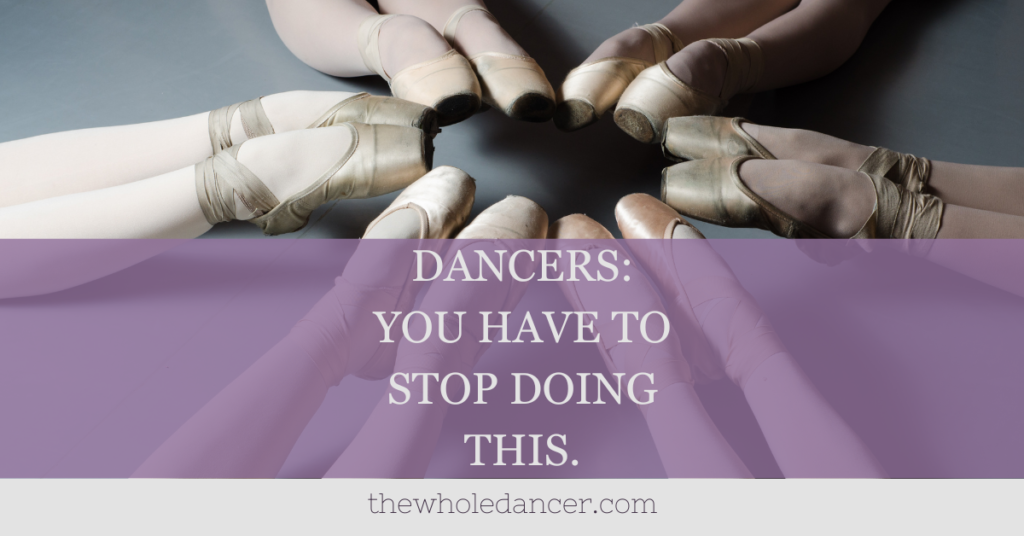Stop saying sh*tty things about yourself out loud. (Ideally, you want your internal self-talk to be supportive too.)
It takes a lot of effort to shift your mindset in a culture that still is quite toxic in many ways. Dancers, you have to be aware of how your words about yourself impact those around you. Raise your hand if you’ve ever heard a friend say something negative about herself and then thought, Well, if she thinks that about herself, she must think I’m huge (fat, terrible, etc.).
If you’re doing the work to develop self-love and improve body image but you’re constantly surrounded by people saying awful things about themselves, it’s not going to help. This post is for whichever side of that coin you land on. Whether you’re talking negatively about yourself or you’re doing the work to better support yourself, read on.
If you’re the dancer who’s talking badly about yourself…
The first step is to stop. If you find it doesn’t feel possible to stop immediately, as if the negative comments you make about yourself are on auto-pilot, then building awareness is the first step. Notice when you make those comments and what’s going on at the moment.
Next, ask yourself why you feel compelled to say those things out loud. Are you seeking validation or reassurance? Is it possible you are looking for connection or support? Do you really feel that badly about yourself?
Once you have some answers to those questions, reach out to a counselor, therapist, or coach for support. You might need an outlet where you’re allowed to be open and honest about how you feel about yourself. A support person can provide that space.
Speak out against the negative self-talk.
If you’re a dancer doing the work to improve your self-image but it feels like all the dancers around you are stuck in a negative loop, compassionately point it out to them. In private, you might say something like, “I’ve noticed you seem pretty down on yourself and your body. Is everything OK?”
Check out this related post : My Body Image Story in Ballet
It’s possible their body is just something they’re blaming for other things that aren’t going well. If they’re not being cast in the roles they desire, not finding success in auditions, or worried about the uncertainty of their future in dance, the body can become a scapegoat. It’s also possible they truly feel their body is too big, wrong, or undesirable in dance for some reason.
If they express any of those concerns to you, convey to them their intrinsic value and encourage them to seek support. At the same time, you can be open and honest and let them know how their negative self-talk impacts you.
Building self-belief.
Whether you’re the body basher or the one being impacted by the negative self-talk of others, it’s essential to start building your self-belief. One of the top ways I support dancers to do that is to begin caring for yourself in intentional ways.
Care for your body every day and especially after a long day of dancing. Take a bath or even just a hot shower with lavender essential oils diffusing. Try a hot towel scrub for relaxation and improved circulation. Look for ways to care for your body and consider your thoughts as you do it.
All of this will help you to build body image resilience. Improving body image is an ongoing process for most. It’s not suddenly perfect one day. It takes time to develop that belief. Self-love allows you to see that you are intrinsically valuable as a human AND dancer at any shape or size.
Don’t make their words about you.
When you hear someone say, “Oh my god, my thighs are huge,” it doesn’t mean that person thinks your thighs are bigger or worse than theirs in some way. Even if you perceive your thighs to be bigger than theirs. The comment they’re making is purely about them and their own fears, pain, anxieties, or insecurities.



